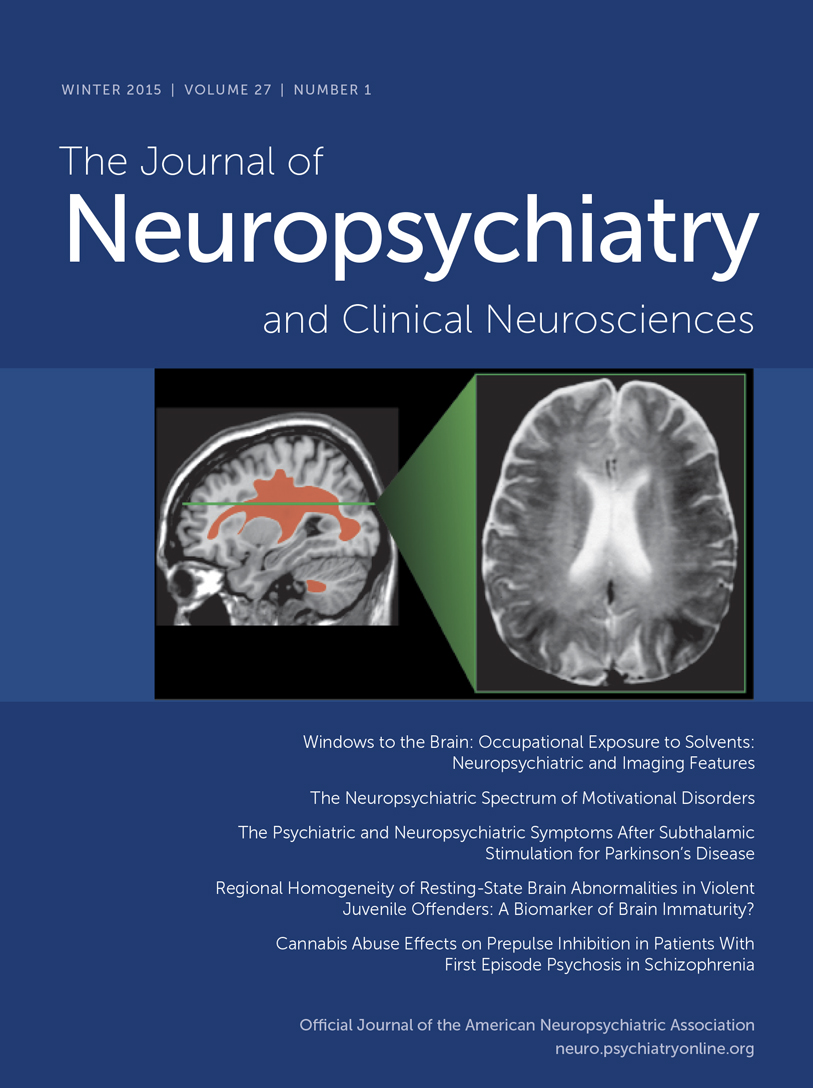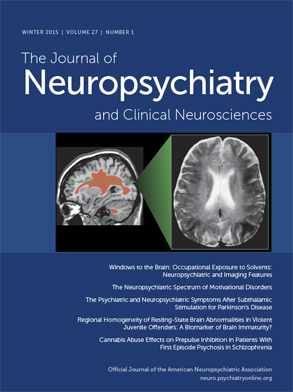To the Editor: There is a limited amount of literature about psychotic disorders in association with syringomyelia. This report describes a patient who has syringomyelia (surgery was done more than 20 years ago), presenting with an insect-crawling sensation over the whole body in the last 2 years. Her symptoms improved with an antipsychotic and a hypnotic. This case highlights the importance of taking a detailed medical history in psychiatric setting, especially in patients with an underlying neurological condition. Additionally, it demonstrates a rare association of syringomyelia with tactile hallucinations.
To date, several case reports have highlighted the association of Arnold-Chiari malformation with psychiatric symptoms. To our knowledge, four cases have been reported for an anxiety disorder,
1–4 one case was associated with dysthymia,
5 and one case was associated with a schizophrenia-like psychotic disorder.
6 There is no previous report of having tactile hallucinations in association with Arnold-Chiari malformation or syringomyelia.
Case Report
“Mrs. Y” is a 75-year-old married housewife. She had no history of psychiatric illnesses and no history of illicit drug use. She was seen at our outpatient clinic, complaining of a sensation of insects crawling on her skin for 2 years. She had a medical history of syringomyelia, with a cervical laminatomy of C5–C7 and syringo-subarachnoid shunting performed. Her illness was complicated by spastic paraparesis, hyperesthesia, neurogenic bladder, recurrent urinary tract infections, and extensive bedsores.
She described a gradual onset of the insect-crawling sensation in the last 2 years, with increased intensity and frequency in the recent few months. The sensation happened daily all over the body including the limbs and trunk. The feeling persisted throughout the day. She could only feel them and never actually saw or heard them. She was convinced that there were insects on her body and would repeatedly demand her husband to sweep her body for her as she was unable to do so. Her sleep was affected by the sensation. She had no other psychotic symptoms. She did not have any mood or anxiety symptoms. She had no memory decline and she scored 26/30 on the Mini-Mental State Examination.
Her clinical picture suggested delusional parasitosis. Sulpiride was started orally at a dose of 50 mg/day and was gradually increased to 100 mg/day. Imovane was also prescribed for improving her sleep as required. On receiving the above treatment for 2 weeks, she reported a decreased feeling of insects crawling on her skin with sulpiride, and the sensation was gone about 3 weeks after initiation of the psychiatric drugs. Further outpatient follow-up, including both psychiatric and medical appointments, are arranged for the patient.
Discussion
In the case described here, the symptoms of tactile hallucinations appeared more than 20 years after the diagnosis of syringomyelia. The sensory deficits of syringomyelia might present as tactile hallucinations as demonstrated in this case. The tactile hallucinations might subsequently develop to the delusional level if patients are convinced of being colonized by insects or parasites. This case illustrates that the neuropsychological symptoms caused by syringomyelia could vary from person to person. The importance of cooperation between different subspecialties in managing patients should be highlighted in the presence of psychiatric symptoms in patients with underlying neurological conditions.

